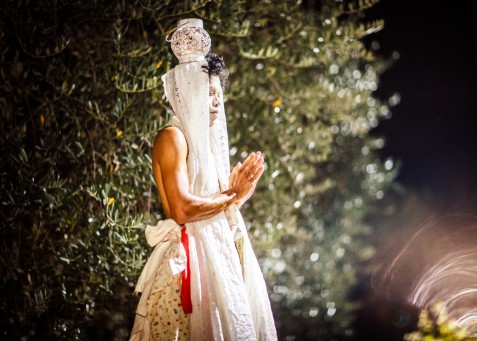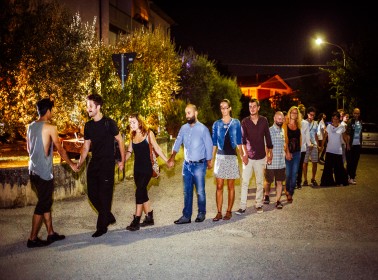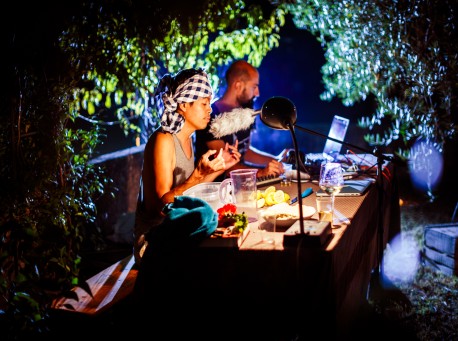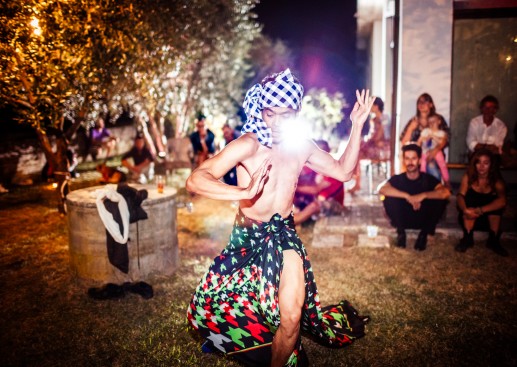
My grandmother will turn 93 next year. She stopped cooking since her major stroke attack that happened about a year before I left for Europe in 2010. I was there when it happened. She was working in the money changing business that she founded way back in the 80's; and has been going to work everyday until the day of the attack. I know the place very well, because it used to be my 'sleeping shack' when I was studying at the university, since my father's house was more than an hour away by car from Manila, or five hours when there is heavy traffic (I failed my Environmental Science class just because I missed seven classes at 7am). The office is also where I always had lunch with her. The day she had the stroke, I was just passing by to see if there was some food, and because she would normally give me 50 pesos (1 euro) as extra allowance whenever I show up.
I've never heard that kind of painful scream before. She usually was the daily picture of grace, calmness and dignity that made her the queen of disputes. She had the power to appease two opposing cousins, or negotiate a deal with greedy money changers. 'Me' (pronounced as 'meh'), as her children would call her, got into the money business by chance. When she immigrated to Manila, she found work at the National Post Office. Her charm and skill in relating with other people got her promoted to Postmaster. She did not save a lot of money, but she made a lot of friends, a network that included the ambiguous money traders of the red light district. This was a timely business then as American money was pouring over the Philippines due to their heavy presence and influence, military, economy, tourism and everything in between. My grandmother saw this as an opportunity to make a good living. She had good intentions. After retiring from being a postmaster and with a backing of some friends who lent her capital, she opened up a money changer (called Patricio's Gift Shop and Money Changer). It prospered so much that it became the 'kanin at ulam' (Filipino bread and butter analogy) of the entire Patricio (our family name) clan for more than three decades. I was already apprenticing there whenever I had free time from school, but it became clear that it was not my line of work. Spending the whole day counting money, converting values and collecting loose changes. The money changer got robbed half a dozen times and...my eldest cousin who also worked there was shot to death while trying to bring money into a bank. Despite all this, she went to work everyday and assumed her role as the benevolent empress. For 30 years.
patience
So nobody expected it to happen. I was just about to eat my lunch when she screamed. A wild scream that I did not think belonged to her. One moment I greeted her with a kiss and she was counting money and the next moment she was spread helpless on the floor and in so much pain. This moment marked the end of an era. Because soon after, the business started to slowly collapse. I did not mind the downfall of the family's money resources. The other side of my family taught me to have less. What made me sad was that her collapse on the floor coincided with the recession of certain traditions that evolved because of abundance. Paralysis meant my grandmother could not cook anymore. Not much family gatherings anymore. Having money was not just about having money, for 'meh', it was used as a tool to weave a social fabric of a big big family. She made it happen through cooking. Every year, I saw up to my third and fourth cousins at least 3 times because my grandmother cooked a feast for a family of around 100 to 150 people that involved feeding them the whole day. Some other relative of course contributed some dishes but everyone anticipated her Menudo (slow cooked pork stew with carrots, potatoes etc.), which I have never tasted anywhere else. She cooked a lot more because it also became tradition that everyone could bring some leftovers home. Tupperwares are brought back to respected houses and are immediately frozen so they could be consumed for days and days. The more time its left, the better it tasted. The pretext of the banquets were three of the most important events in the family: Christmas, the overnight chanting of the Passion of the Christ, and her birthday. It underlined one thing. She was the undisputed queen of flavour in the family and this was enough to keep it together. It was enough to withstand even the grief of death (she buried her husband, two of her sons and one grandson), because there were even banquets during (one week of wake) and after the funeral. She handled all this with graceful composure that seasoned a supreme presence which always inspired the family to remain united. It was all about that. Presence. A consistent sustained presencing. She went to work everyday because they needed her inspiration everyday. Her absence int he kitchen meant the reunions happened less and less. If it did, it had less flair than before. Nobody really stepped in to cook. Nobody else in the family had as much practice as her.
An inspiration came today as I was being treated to an amazing lunch by a new / old friend. She slow cooked beef bourgignon in a cocotte, and in the honor of her spontaneous Filipino guest, she paired it with steamed white rice. It reminded me of my grandmother's slow-cooked, soft beef stews and rice. Kanin at Ulam.
In April, she will have her birthday again. Hopefully with a visa in hand, I will make a pop-up dinner of my dreams: to cook for my grandmother and re-enact our reunion. If its just about the cooking and presence, as 'meh' has demonstrated, I believe the time is ripe to bring back my work to the service of my family. I have an accomplice/s who will help me (the accomplice is the next topic of the story). And I will find her a gift on Thursday, when I go to Zaragoza to cook a dinner for a women's club organized by a woman who I used to live with in Madrid. Its an opportunity to rehearse our re-encounter. Then I will make a pilgrimage to the mystique goddess of Pilar to say a prayer in her honor.
My grandmother's mother was called Anicia. When she gave birth to 'meh' on April 20, 1925, she gave her the name... Paciencia.
to be continued...
Madrid, Chueca
06 December 2016
(first draft)



Pepe Dayaw is a storyteller. His material comes from experiences he lived.